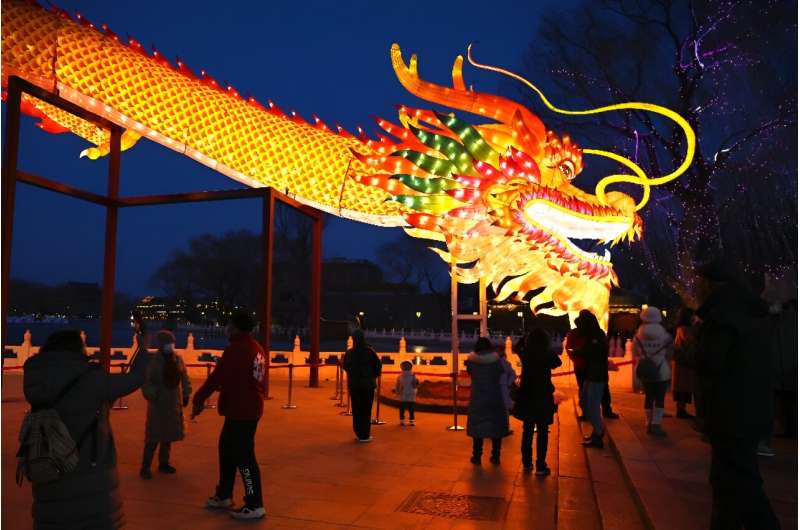This article has been reviewed according to Science X's editorial process and policies. Editors have highlighted the following attributes while ensuring the content's credibility:
fact-checked
reputable news agency
proofread
China new year holiday spending surges past pre-pandemic levels

China's new year holiday spending last week surged past pre-pandemic levels, official figures showed, a rare bright spot for an economy struggling with sluggish consumption and deflation.
Domestic spending on entertainment, dining and travel soared during this year's "Golden Week", which officially ended on Saturday, according to a statement from Beijing's Ministry of Culture and Tourism on Sunday.
Chinese travelers made 474 million trips across the country during the eight-day break, up 19 percent from 2019, the ministry said—the world's largest annual migration.
And domestic spending on tourism came in at 632.7 billion yuan ($87.9 billion), up 7.7 percent from 2019, the ministry said.
This year's new year holiday was the country's second after the abrupt scrapping in late 2022 of China's strict zero-COVID pandemic policy, which depressed consumer spending and hit business confidence through snap lockdowns and lengthy quarantines.
Mainland Chinese markets rose at the open on Monday after the holiday break, with the Shanghai Composite Index up 0.28 percent and the Shenzhen Composite Index on China's second exchange adding 1.16 percent.
'Pent-up demand'
The latest holiday data showed that "there was substantial pent-up demand to be released", Ting Lu, chief China economist at Nomura, said in a note on Monday.
But he warned against reading too much into the strong spending figures, as "we need to take into account the very low base from last year during the height of the COVID 'exit wave'", referring to a rapid surge in infections across the country in December 2022 and January 2023.
While total spending was up, the average spending per trip was down 9.5 percent from 2019, according to Nomura calculations.
And analysts at Goldman Sachs also pointed to the "slightly longer-than-usual" holiday period this year, which they said "contributed to the record cross-region passenger flows and encouraged more long-haul travels".
The national holiday in 2019 was seven days long, compared to this year's eight.
The holiday data comes after months of struggle by officials to kickstart growth in the face of a prolonged property-sector crisis, soaring youth unemployment and a global slowdown that is hammering demand for Chinese goods.
Policymakers have in recent months announced a series of targeted measures as well as a major issuance of billions of dollars in sovereign bonds, aimed at boosting infrastructure spending and spurring consumption.
But that, and recent announcements including central bank interest rate cuts and measures to boost lending, have had little impact so far, with consumer prices falling in January at their quickest rate in more than 14 years.
© 2024 AFP





















